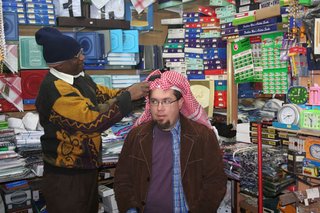Most every American wants to be a rock star - American Idol repeatedly demonstrates this. And tonight it was evident that the members of Boston's Firebird Ensemble are no exception.
Tonight Rebecca and I ventured out to The Music Hall, braving the freezing temperatures, to have a contemporary music adventure. I was intrigued by a luke warm review of The Firebird Ensemble's performance in Somerville, MA last week - not intrigued so much by the luke warm nature of the review, but by the repertoire discussed in the review. It seemed an eclectic and adventurous mix of new classical works and arrangements of pop tunes for classical instrumentations. Something we don't see enough of in Portsmouth. So I felt a strong urge to be there to witness the evening.
The members of the ensemble are more than competent. Though only one member stuck out in the crowd - the talented flautist Alicia DiDonato (described as a "Firebird Frequent Flyer", not a "Core Member" of the ensemble). Of the more than a dozen works performed, her technically and musically brilliant interpretation of Ian Clarke's Zoom Tube (1999) made one overlook the novelty factor of the composition, and merely witness in awe a powerful and natural performer.
The program was pretty unbalanced. It seemed that there was little of substance as far as the music was concerned. Each half was distinctive. Part one was "classical" contemporary music, with the exception with the opening set of Schoenberg Caberet Songs from 1901. It seems they were chosen because the evening was a celebration of Frank Jones in Portsmouth, and since Frank Jones came to Portsmouth in 1901, it was naturally appropriate to perform a piece from that year. Nevermind that the piece was completely disconnected from the tone of the evening that followed.
Next was a series of new works, the oldest of which was composed in 1988, that culminated with the aforementioned Zoom Tube. Unfortunately, the only other piece of note on the first half of the concert was Roshanne Etezady's Unsafe (at Any Speed) (2001), the title of which refers to a classic book by Ralph Nader, and specifically about his criticism of the Corvair automobile. This piece for piano and percussion, was energetic, inventive, and performed with intensity and vigor by Sarah Bob on Clavinova (though I would have preferred a grand piano) and percussionist Aaron Trant. Trant was additionally featured in the first half as a composer. His composition, Dictit (2001), is a series of three pieces for two instruments that are improvisatory in nature, though I'm not sure I get the first movement, which juxtaposes a twelve-tone theme with improvisation. The problem in my mind is that twelve-tone music is the embodiment of compositional control removed from a tonal environment. Yet improvisation is the embodiment of compositional freedom. And the improvised solos, played against the twelve-tone lines, were jarring in their use of recurring and repeated pitches, which seem so foreign to me in a twelve-tone context. So I found my self in a philosophical dilema, one that the music was not interesting enough for me to thoroughly think through. But vexing just the same.
The second half of the program was essentially rock cover tunes, many of which were arranged by a young (17 years old) guitar virtuoso, who made the trip up from Massachusetts to sit in on a few tunes. While the young Fred Sladkey's arrangements were in many ways the most interesting music of the evening, they didn't have the weight to carry a program.
So, all in all, the evening was a bit of a bust. But I commend The Music Hall for its adventurous programming. I certainly enjoyed getting out on this chilly eve to hear some live music. And their batting average is still the highest of any musical venue in the region.





























